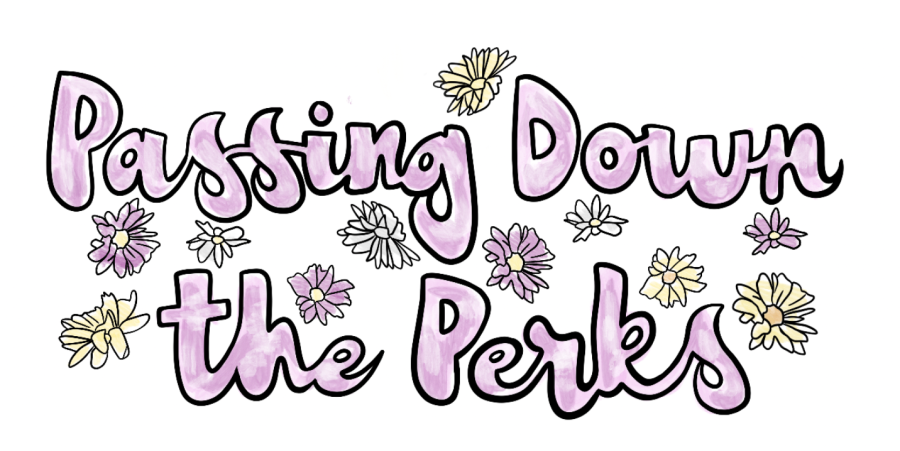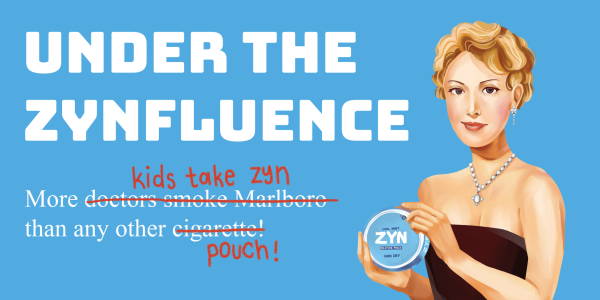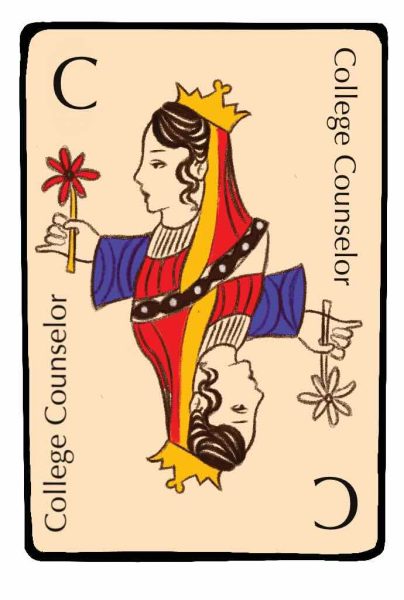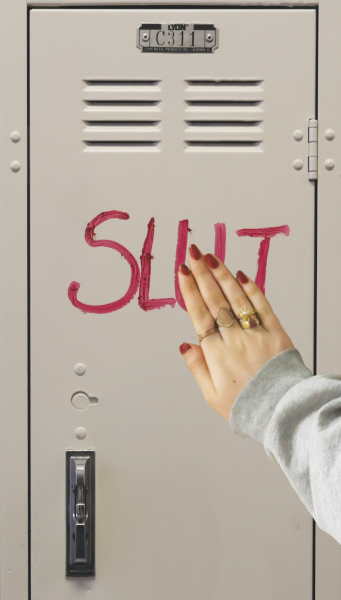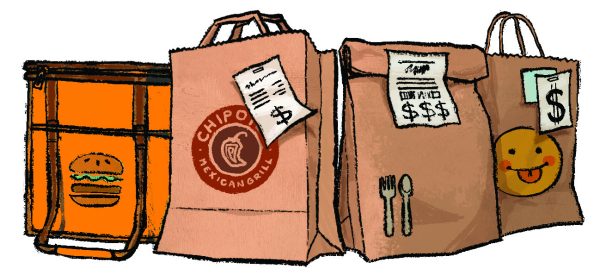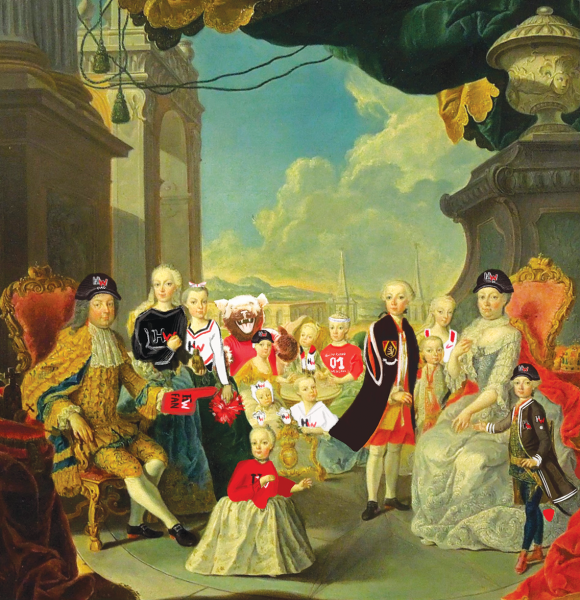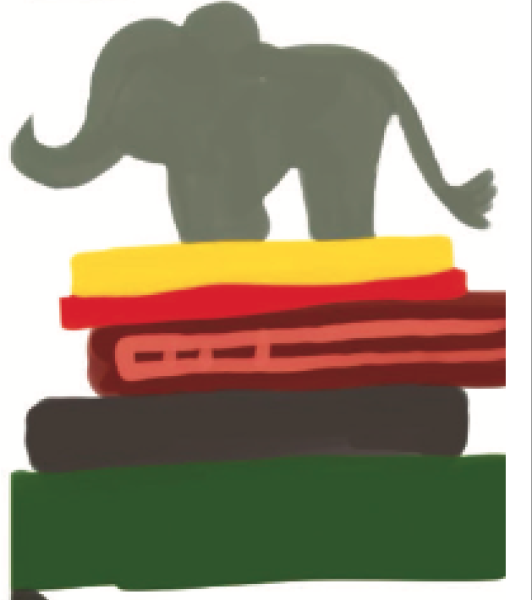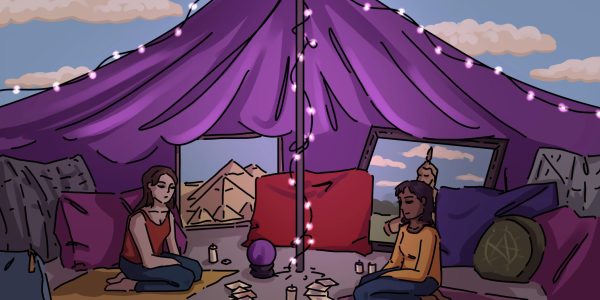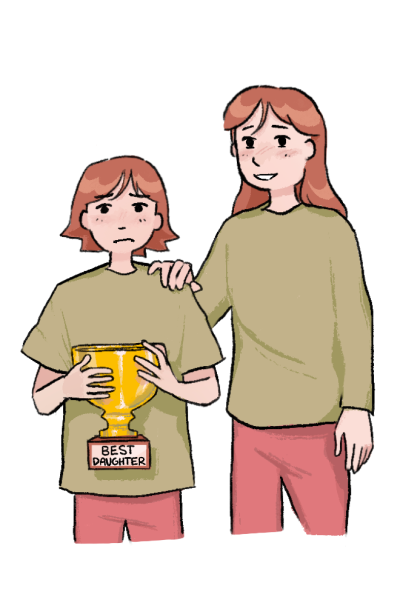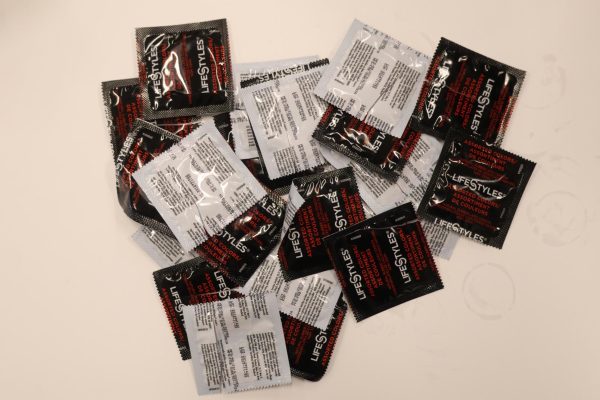Passing Down the Perks
Students and alumni recount senior traditions they have partaken in at the Upper School such as the graduation pool jump and Tap-Out.
Illustration by Alexa Druyanoff
‘Passing Down the Perks’ Article Title Illustration by Alexa Druyanoff
February 20, 2022
As Spencer Sherman ’21 sprinted past the Munger science building, he began unbuttoning his Hawaiian-printed shirt. His smile beamed and cheers of laughter could be heard on the Quad from the Copses Family pool, where 300 students prepared to leap into the water, celebrating their last day of senior year and the end of their high school experience.
“[It] felt like a dream,” Sherman said. “Jumping into that pool with [my classmates] really drove home the idea that my high school journey was coming to an end, so it was a mix of some of the highest highs and lowest lows.”
Sherman said he enjoyed returning to campus as a senior after spending months learning remotely because he was finally able to socialize with his classmates. He said he and his peers spent the last few weeks of their in-person senior year reminiscing on their years growing up together.
“We were all just happy, enjoying each other’s company,” Sherman said. “The best part of those last weeks [was] sitting down with some of my closest friends talking about what we were feeling.”
Students discuss the role of the senior tables in their high school experience
Sherman said he valued spending time with his classmates at the senior tables, but he also enjoyed mingling with underclassmen on the Quad.
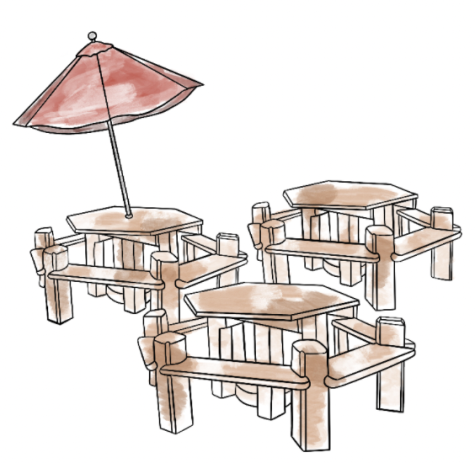
“I never felt the need to sit at a senior table, and [I felt that] it shouldn’t matter where people sit,” Sherman said. “I had many friends outside of my own grade, and the upper school social scene helped connect more people of differing ages. Breaking [social] barriers with people younger than me felt natural and necessary to actually enjoy being on campus.”
Ava Benavente ’20 said although she spent time in her senior year interacting with underclassmen, the senior tables were special to her and her peers of the same grade, allowing them to create memories on the Quad specific to the school’s senior traditions.
“I planned my homecoming party and fell in love with my [ex-girlfrend] at those tables,” Benavente said. “I even remember my peers opening [their] college acceptance letters there.”
Jack Hartmeier ’22 said compared to many of his peers, the senior tables are unimportant to him. He said instead of spending time on the Quad during the lunch period, he and his friends enjoy going off-campus to local restaurants. Hartmeier said he leaves campus twice a week to avoid the frenzy of the new common lunch period.
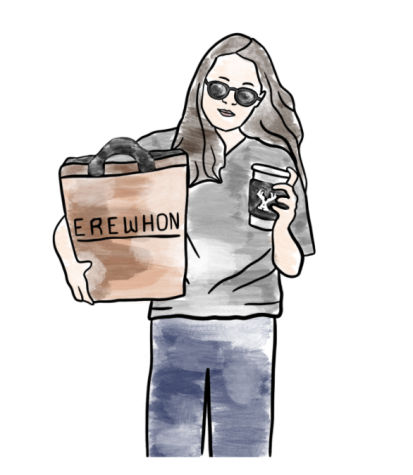
“Since the lunch period is shorter, my friends and I go to places that are more local like Yeastie Boys, Erewhon, Le Pain Quotidien and Joan’s on Third,” Hartmeier said. “[My friends and I] don’t need to worry about finding a lunch table or waiting in line for the cafeteria.”
Upper school counselor Michelle Bracken said in the past, second-semester seniors have been creative with free and lunch period activities. She said the Quad has traditionally been a place for seniors to spend time together before going away to college.
“There used to be kids who would bring [inflatable] pools onto [the Quad.] I remember seeing [a senior]someone bring a hibachi [grill] and cooking for their peers,” Bracken said. “When it would start to get warm after spring break and [seniors] were into college, a common thing to see on campus were water balloons being thrown around the Quad.”
Bracken said she feels that upper school traditions are usually passed down from year to year, but that online school has reduced students’ awareness or interest in participating in them.
“A lot of our traditions [at the Upper School] are based on what students have done in the past years,” Bracken said. “I’ve noticed many traditions have been built off of seniors doing what they had seen upperclassmen do when they were younger, and now there is a lack of that because of how long we have been off campus [due to the pandemic].”
Bracken said the role seniors play on campus has changed beyond the hierarchy of seating arrangements on the Quad. She said she has noticed a shift in the dynamic between grade levels with stronger relationships between upper and lowerclassmen, which she said she believes is an outcome of the new block schedule and common lunch period. Bracken said before the pandemic, seniors were seen as leaders, but after a year of remote learning, the hierarchical feel between grade levels has faded.
“I think there were certain things that were expected when you [were] a senior,” Bracken said. “Seniors earned their leadership by being on the campus for longer than the underclassman. [Now,] I think it seems like students are much more equal.”
Benavente said before beginning online school, she enjoyed school traditions that united the student body without distinguishing between the grade levels, referencing Tap-Out, a campus-wide game, in which students are each assigned an individual target whom they are supposed to “tap out.” To tap another player out successfully, the student must record their attempt, post it to the Facebook group designated to the game and wait for a “Game Master” to approve it, and move onto their next target.
Campus-wide game, “Tap-Out” returns to the Upper School
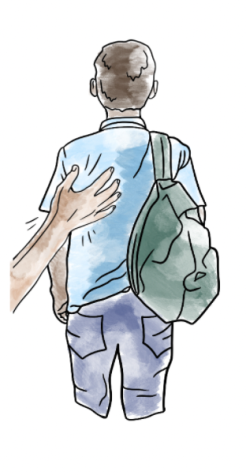
Benavente said when she was a student at the school, students went to great lengths to tap people out. She said part of what made Tap-Out a communal game was that people were eager to “tap out” peers they had never met.
“Tap Out was a very fun social [activity] at the upper school,” Benavente said. “Everyone [was] trying to figure out who everyone had and doing shady things to find each other’s schedules. I remember there was this guy who found a girl’s address in the [Student Directory] and waited outside her home to tap her out.”
Benavente said the Tap-Out tournament and other senior traditions were great ways to meet new people on campus and make friends in other grade levels. She said all grades communicated with each other, but sophomores and juniors looked up to seniors.
“Activities like Tap-Out and Peer Support aided in blurring the line between grade levels,” Benavente said. “When I was in 10th and 11th grade, I remember being very aware of who the seniors were and recognizing that I wasn’t one of them. Then when I was a senior, I was very aware that I had earned my respect as a senior.”
Sherman said the Peer Support program, an interpersonal student-led counseling program, was another way for him to connect with students from all grade levels. He said this was important during online school because it allowed him to keep in contact with and meet new peers in other grades.
“Being in Peer Support allowed me to create friendships with many [students] outside of my grade,” Sherman said. “I enjoyed coming back to campus and seeing all of my peers that were in my group.”
Ruby Kemper ’24 said the absence of socialization between grade levels during the pandemic has affected the relationships on campus.
“Seniors were only at the Upper School for six months before the pandemic began, so they never had a full year on campus to experience Upper School traditions,” Kemper said.
Kemper said her two older siblings, Tess Kemper ’15 and Julian Kemper ’20, are often nostalgic about their time at the school and the traditions they participated in. She said both her sibling are still very close with the friends they made at the school.
“My sister still talks about the [Senior] Scavenger Hunt today,” Kemper said. “I [also] remember hearing about the senior tables from my older siblings and how they created many memories around them.”
Hartmeier said being the youngest of four siblings who attended the school has allowed him to look forward to various senior traditions, such as off-campus privileges.
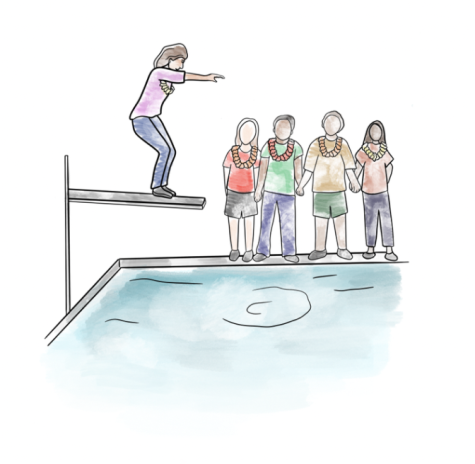
“I would always hear my older siblings talk about going off-campus when they had multiple free periods,” Hartmeier said. “Later in the year, after [Advanced Placement (AP)] tests, when my siblings would have a two-hour break in the middle of their day, they would go to get lunch with friends. It always seemed like so much fun and an exciting part of becoming a senior.”
Hartmeier said he sees parallels between his siblings’ experiences as a senior and his own. He said experiencing some of the traditions he heard about allowed him to appreciate them more.
“I feel like my senior year has been similar to those of my older siblings,” Hartmeier said. “Being at [Senior Ceremony] felt like another tradition I was supposed to do as a senior, and when I was standing [on the field] with my class, I truly felt like a senior. I remember when [my siblings] told me about jumping into the pool on the last day of high school. I’m looking forward to doing that.”



































